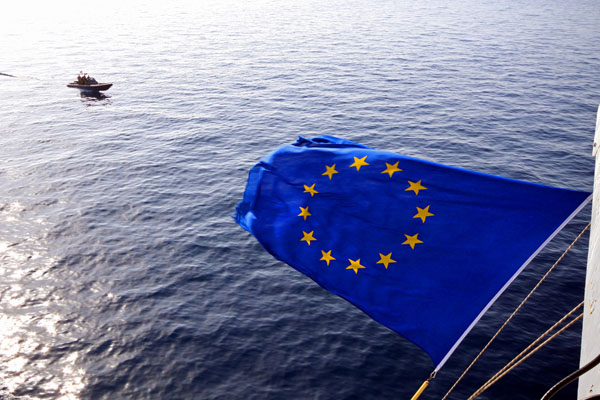The three top diplomats to try a mediation before the extraordinary meeting on penalties. Fabius: “return to dialogue.” Barroso called Yanukovich

A last, desperate attempt of negotiation before sanctions are imposed. The European Union tried the diplomatic way once more, and sent French, German and Polish Foreign Ministers in Kyiv to meet with government and oppositions, befor the extraordinary meeting of the EU-28 Foreign Ministers to be held later in the day.
French Foreign Minister Laurent Fabius said that he, German Foreign Minister Frank-Walter Steinmeier and Poland’s Radoslaw Sikorski would hold meetings in Kiev to gather the latest information before the meeting, trying to make the parties “return to dialogue.” He also underlined that “It is necessary to re-establish a dialogue between the opposition and the government.”
In the meantime, the White House issued a statement to declare the US are weighing the required measures, including sanctions, against those responsible for violence during the protests, in a coordinated action with the European Union.
The European mission should urge the Ukrainian opposition to re-open the dialogue, suggested Russian Foreign Minister, Sergei Lavrov, who “called for partners in the European Union to use their close and daily contacts with the opposition to urge them to cooperate with the Ukrainian leadership,” in a note on his website. “The opposition should distance itself from radical forces who have unleashed bloody riots and essentially embarked on the path to a coup d’etat,” he added.
Josè Manuel Barroso is pursuing a diplomatic solution too. The European Commission President called Ukrainian President Viktor Yanukovich to express his “shock and utter dismay” in watching developments over the last clashes in Ukraine, leaving several victims on the ground. Barroso added that the Union is calling “on all sides to immediately put an end to the violence and engage into a meaningful dialogue,” condemning “in the strongest terms the use of violence as a way to solve a political and institutional crisis,” given that “it is the political leadership of the country that has a responsibility to ensure the necessary protection of fundamental rights and freedoms.”
President Barroso highlighted that the EU has been offering its sincere assistance to facilitate political dialogue between the sides and de-escalate the situation, but at the same time the Union “will respond to any deterioration on the ground,” as “the Foreign Affairs Council is to meet for establishing targeted measures against those responsible for violence and use of excessive force.”
Letizia Pascale









![Una donna controlla le informazioni sul cibo specificate sulla confezione [foto: archivio]](https://www.eunews.it/wp-content/uploads/2014/12/Etichette-alimentari.jpg)
